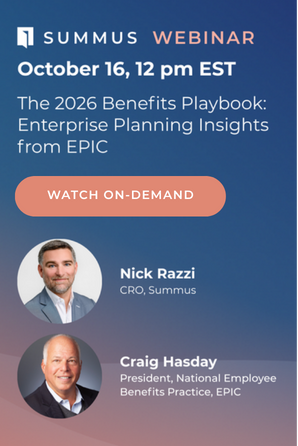By Sarah Baker, MPH, Summus Senior Director, Product Marketing
New marketing and prior authorization rules, changes to Star ratings, and a new focus on health equity have made the Medicare Advantage (MA) final rule a challenge for MA plans. And yet there is a silver lining for health plan leaders. Implemented right, many of the changes now mandated by CMS will lead to medical cost savings as well as improved member and provider satisfaction. When quality improvement bonuses, regulatory compliance, and cost-savings align, the business case for investment is clear. Here are three changes we believe have the most potential for high return on investment:
Changes in Star Rating Measure Weights
CMS has made a number of changes to the Star ratings for 2024. Of note are the readmissions-related measures, and the change in weight of patient experience measures.
Returning Care Transitions and All-Cause Readmissions to the 2024 Star Ratings. The business case on readmissions is clear: the average cost of a hospital readmission is $15,200.1 Programs that improve transitions of care and reduce readmissions have the double effect of improving Star performance and reducing medical spend. Hospital penalties mean hospitals are more willing partners in coordinating care, sharing data, and improving care plans for MA members.
Reducing the patient experience (CAHPS) back to a 2 weight, from their current weight of 4. This change will be helpful to plans that have struggled on CAHPS performance, however, the overall effect of this change is more mixed. Reducing the weight of CAHPS means that HEDIS and medication adherence measures are more important. Due to the steady progress MA organizations have made on HEDIS and adherence measures, it’s harder than ever to reach 4 or 5 Stars. Plans need to renew focus on these measures now in order to score well in 2024.
The data are clear on the most effective strategy for achieving high scores on these measures: primary care capitation and quality bonuses.2 Continued health plan support of primary care adoption of alternative payment models is the most important investment a plan can make in quality improvement. Primary care practices need significant technical and clinical support to transition to capitation. This includes data sharing, population health reporting and benchmarking, and tools to manage costly specialty referrals, such as peer-to-peer consultations which help primary care providers continue to manage patients with more complex needs in their medical home.
Digital Health Literacy
Also in the final rule, CMS recognized that health inequities arise from unequal access to telehealth services and now require MA plans to “develop/maintain procedures to identify and offer digital health education to enrollees with low digital health literacy to assist with accessing any medically necessary covered telehealth benefits.” While most MA plans and providers offer telehealth or virtual care services, many MA members experience barriers in using them, including lack of access to broadband, difficulty navigating confusing apps or websites, entering information on mobile phone keyboards, or setting up remote monitoring devices.
Increased utilization of virtual care and telehealth represents one of the biggest cost-savings opportunities for today’s MA plans. Done well, remote patient monitoring can save $5.2 million for every 500 high-risk Medicare members.3 Direct-to-patient virtual specialty care solutions like Summus save over $4,400 per member. Utilization of primary care telehealth can reduce urgent care and emergency department visits by nearly 20%.4 Programs that improve digital health literacy, and thereby increase utilization of virtual care and telehealth, have a clear return-on-investment for health plans.
Prior Authorization
The prior authorization regulations represent significant operational changes for many MA plans, however, it’s also an area rife with opportunity for improvement. While important for ensuring evidence-based, cost-effective care, prior authorization is the most costly and time consuming process in healthcare administration.5 It contributes to physician burnout and dissatisfaction.6 Incorrectly denied care causes delays in treatment that worsen health outcomes for patients.7 Members who experience denials are more likely to leave the plan. Improving prior authorization processes has potential to decrease costs, facilitate timely access to care, and improve measures of quality and satisfaction.
The regulatory updates in the final rule provide an opportunity for plans to revisit their prior authorization processes in order to create efficient, physician-first processes and patient-first policies that promote evidence-based care and reduce administrative burden. Automation is a key component — over $400 million a year could be saved through automated processes.8 Appropriately incorporating specialty care providers is another critical improvement for prior authorization. This means conferring with appropriate specialists on the creation of policies, as well as ensuring that ‘peer-to-peer’ authorization reviews are being conducted on a specialty-to-specialty basis. These changes can reduce appeals, which can cost health plans over $70 per appeal, and negatively impact Star ratings.
Instead of a ‘check-the-box’ approach to complying with the MA final rule, forward-thinking plans will pause and strategically take advantage of the momentum, and required health plan investment, from the CMS final rule. Through proactive leadership, these plans will implement transformational changes that grow revenue, reduce administrative costs for plans and providers, and improve the health and wellbeing of members.
Summus Supports Health and MA Plans
Summus supports health plans with their quality improvement and cost reduction goals through solutions that transform access to specialty care for both plan members, and primary care providers seeking peer consultations or specialty referrals. Accelerating access to the high quality medical expertise improves clinical decision-making, allowing patients to receive the right care when they need it most.
Learn how Summus can provide a cost-effective solution for your health or MA plan here.
- https://hcup-us.ahrq.gov/reports/statbriefs/sb278-Conditions-Frequent-Readmissions-By-Payer-2018.jsp
- https://www.unitedhealthgroup.com/content/dam/UHG/PDF/2020/UHG-Global-Capitation-Research.pdf
- https://www.healthcareitnews.com/news/how-remote-patient-monitoring-improves-care-saves-money-chronic-care
- https://www.fiercehealthcare.com/payer/cigna-study-virtual-care-can-reduce-unnecessary-er-urgent-care-visits-by-19
- https://www.caqh.org/sites/default/files/explorations/index/2021-caqh-index.pdf
- https://www.ama-assn.org/amaone/ama-recovery-plan-america-s-physicians-fixing-prior-authorization
- https://www.ncbi.nlm.nih.gov/pmc/articles/PMC7062557/
- https://www.healthleadersmedia.com/revenue-cycle/increase-prior-authorization-automation-has-potential-major-cost-savings





